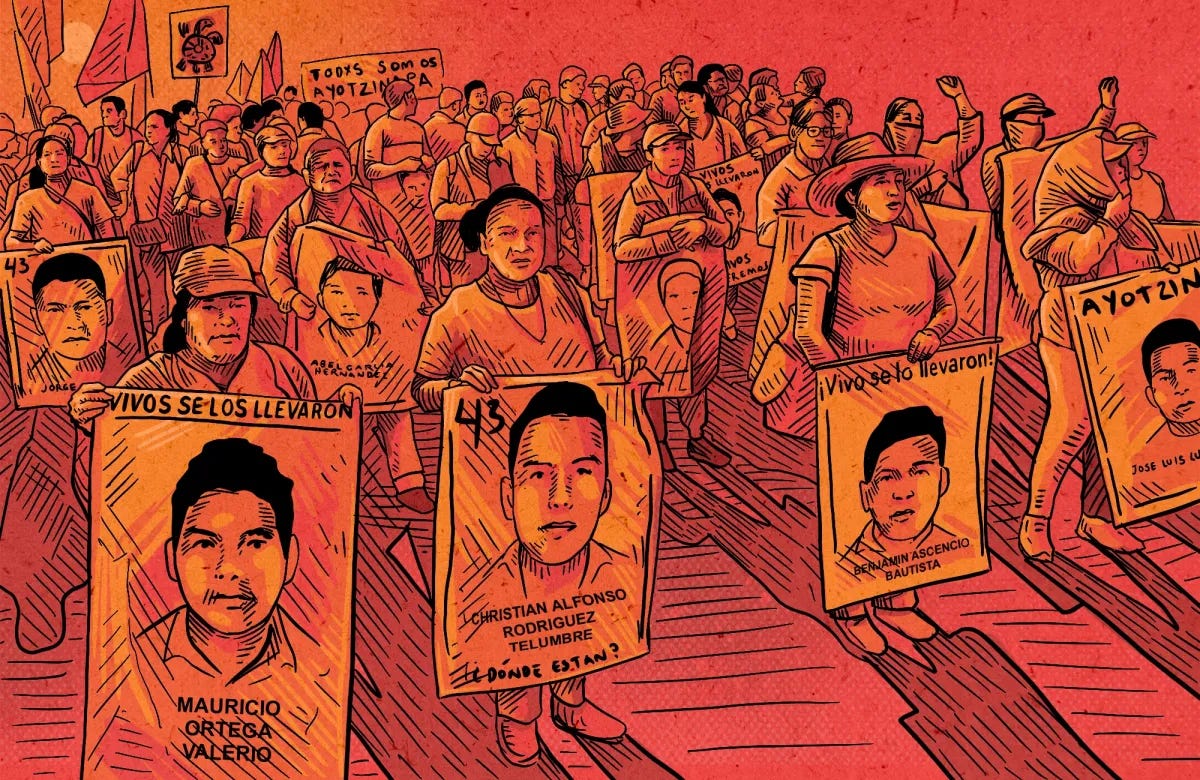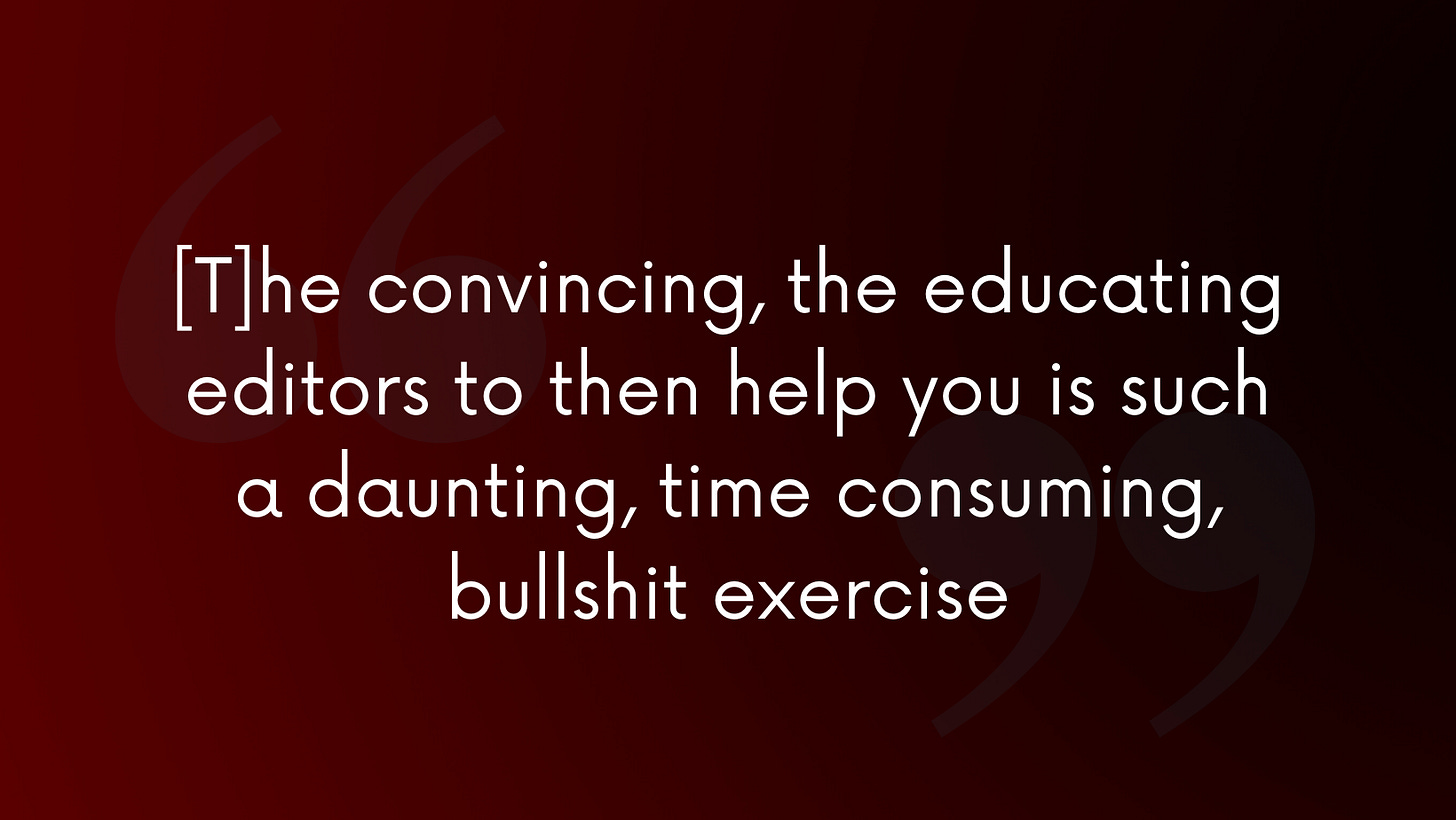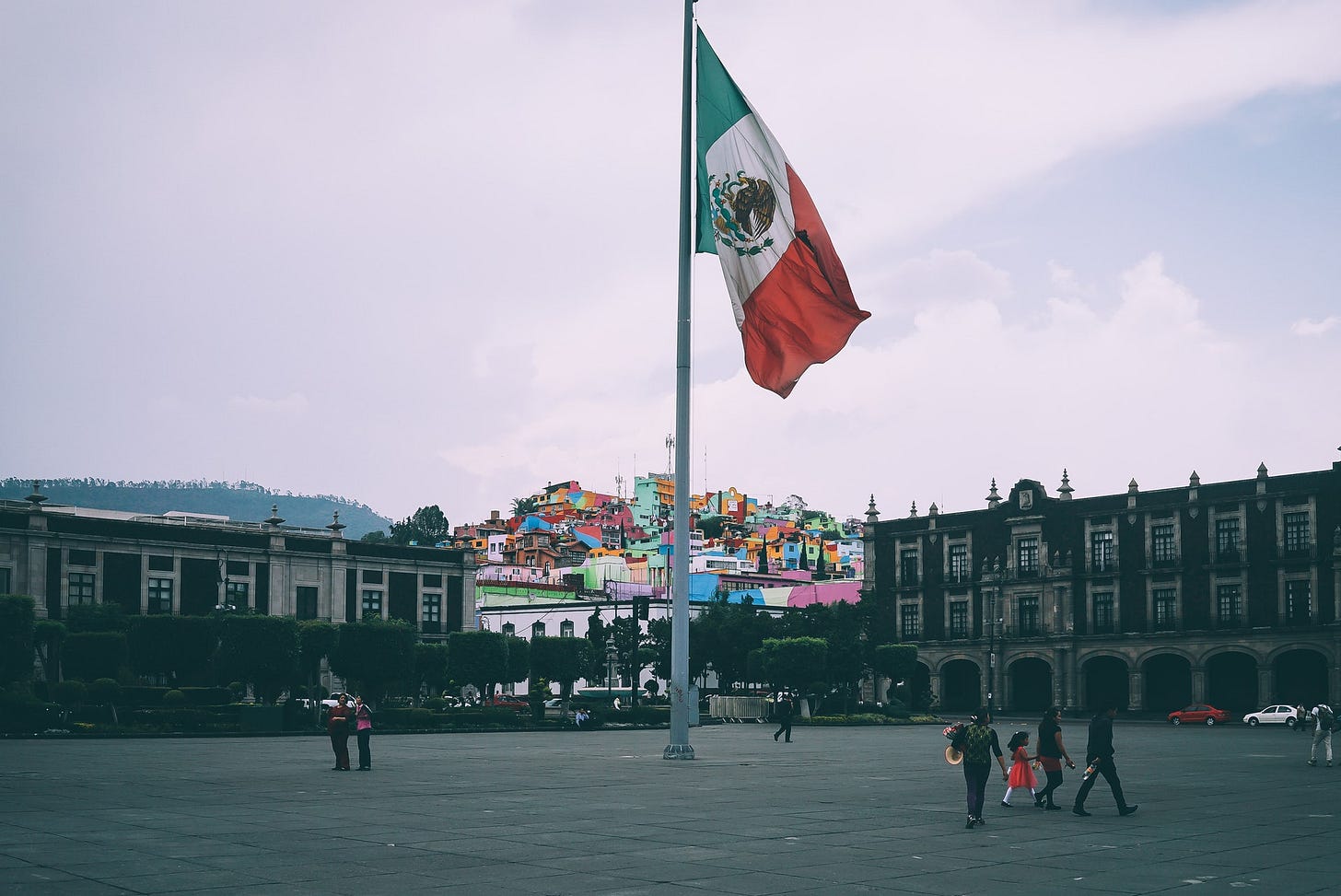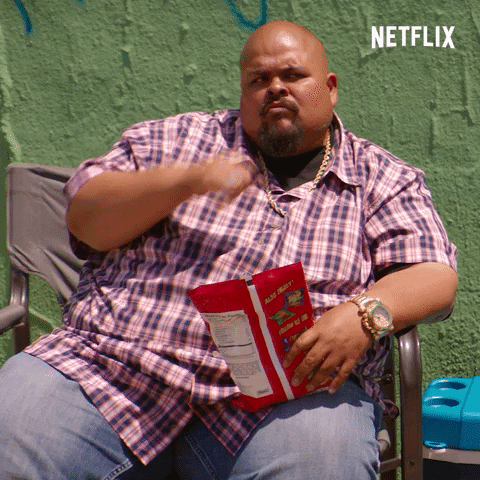On the white editorial firewall
After Ayotzinapa's journey presses us to ask more about basic cultural fluency
The English and Spanish release of After Ayotzinapa is remarkable for a variety of reasons. You’ve probably heard the accolades the podcast has received. For me, the story of how the series came to be is just as intriguing.
The program’s lead, Anayansi Diaz-Cortes, goes there about those issues. Her comments in this interview are candid, and give voice to a challenge we rarely discuss. Namely, what are we to do when the gatekeepers are unaware of basic Latin American history or what’s happening now, and present their assumptions as fact?
The conflicts she opens up about may sound familiar if you’re a Latino who’s been in a newsroom. Diaz-Cortes pushes us to reimagine what these professional and community relationships look like. And, more pointedly, is it on us to do the teaching, or for leaders and staff to do more learning?
Let’s talk about it.
Anayansi Diaz-Cortes is a senior reporter and producer for Reveal. Her work has been featured everywhere from All Things Considered to Radio Ambulante and This American Life. She is a recipient of the Overseas Press Club Award, the Edward R. Murrow Award, and the Third Coast/Richard H. Driehaus Foundation award. Previously, she produced for Radio Diaries and has done extensive reporting in both the U.S. and Mexico. 👇🏼👇🏼👇🏼
What got you here?
I was born in Mexico City and I grew up in Miami. I went to university in Miami. So, I had the Latin Americanist in me, always. I was a Latin American studies major, and got a Master’s degree in it. But this idea of telling Latin American stories was something I think I had in some version of myself.
I certainly had no idea what public radio was until I was like 25 or so. Once I started in public radio – like so many of us you know, coming at it como Latinos or whatever – you come in the community way. I was an outreach coordinator. Now that's all fleshed out as audience teams. That's how I got introduced to public radio, by doing this kind of outreach work.
When I was first doing it for film and then radio, I was like, ‘oh my God, this is so amazing.’ And then, ‘how can you tell Latin American stories for a U.S. audience?’ With After Ayotzinapa, I worked at a company called Radio Diaries and we produced long-form documentaries for All Things Considered. I did a huge story in 2008 for the 40th anniversary of the Tlatelolco student massacre and it was all narrated; at the time, it was 50 hours of tape for 20 minutes. It was intense because we were casting people in English, which was hard because there was no writing.
That brought me to a woman named Kate Doyle from the National Security Archive. What Kate does is she basically FOIAs the U.S. government for information about human rights atrocities in Latin America. She has built a whole legacy around truth and truth commissions and forced disappearance in Latin America. So, we kept our relationship and she was a huge part of this 1968 reporting because, when the Archives opened in Mexico in 2000, suddenly there was all this information flowing out of the country.
In 2018, she reached out to me. Ayotzinapa was a huge story for our community here and there. In Mexico, it was what was called in human rights terms a paradigmatic case. This is where cases hit the wound of forced disappearance in Mexico, and launch movements wherein Mexico has to face its impunity. It’s the drug war and truly a huge problem.
We all kind of know the story in some way. Los 43, los desaparecidos. But I get on the phone with Kate. Ya empieza the Alice-in-Wonderland-rabbit-hole of this story, which is the layers of the UN, the investigation, the drug war, the buses. So it becomes very clear that it's like, ‘I need to do this story for public radio with you.’
It was years in the making. We put in a year of invisible labor before we even pitched it to Reveal – as a story of just talking through it, me reading the documents, understanding the layers of the story, and then bringing it to our editor, who, I think I can say this even on the record, at the time was like, ‘wait, wasn't that case solved in 2015?’
That's how confusing it was. To the listener, they say, ‘wait, it was solved.’ What he was referring to is the verdad historia, which is what the Mexican government sealed as ‘this is the theory of the case, and this is what happened that night.’ Now we know it was a complete fabrication to feed to international investigators to rubber stamp their theory and officially block out the investigation, close it and move on.
It was the lawyers of the parents, people like Kate, and the parents themselves that were continuing to say, ‘this is bullshit.’ Then their view comes to be true. It's also about the privilege of the case, because it's 43, but 100,000 people disappeared in Mexico since 2006. A small percentage of that is from the Dirty War, but really the bulk of it, like 90 percent, is since 2006, which was since the Merida Initiative that basically militarized Mexico on the part of the U.S. to fight the drug war.
All this to say that Ayotzinapa was this small story that tells a larger story. And from the beginning, since hearing the story, but certainly after talking to Kate, it was like there's this narrative version of this story that is universal, in the context of Trump and impunity. It's a story about what happens when there's no accountability. What happens when you have a broken criminal justice system that doesn't even have the capacity to help you if your relative disappears. There's no justice system for you. It is that there's simply none of that. You don't even know if these cases are ever solved. If you can't solve this case, the most important case in contemporary Mexican history of forced disappearance, what does that mean? So that was very interesting to me.
That's what landed us here basically. Three years reporting, two years for Reveal, and under a pandemic with all the other assignments in play.
What was the most culturally challenging part of telling this story?
It sounds like insider baseball, but maybe for your audience this makes sense. It's convincing editors. Before the story, I was like, ‘oh, this is what you have to do.’ And ‘this is how you get it up.’ And ‘this is part of it.’ But after the story, the convincing, the educating editors to then help you is such a daunting, time consuming, bullshit exercise over and over and over again. It becomes, ‘okay, this is a country, this is a state, this is a city. This is forced disappearance. This is the drug war.’ All of it.
The reason we have to do that a lot of the time is because our editors are homogenous and usually of a certain type. Not well-versed in anything outside of a U.S. context. That is a huge challenge. The kind of white editorial firewall of not thinking about anything beyond U.S. borders was insane. And having to fight to say ‘this story deserves a segment’ whereas really it deserves seven episodes.
Alas, we were able to get three.
There needs to be an editorial awakening within our industry to understand we have to be able to tell these stories without having to teach about why is this important to a U.S. audience, every single step. And without having to convince our editors that this is important.
What were you able to do to convince people?
I mean this is what we do, the work of reporting. Reporting is one huge part and then the superpower of narrative, which can be very extractive – let’s not diminish that. Yet there's something about sitting down and saying, ‘there's this prosecutor. And you know, once upon a time there was a man. This man was the secretary of this group of experts that was trying to fight for justice.’ So, it was doing this entertaining Netflix version of a series, which is very problematic to do, and cinematize it. Thinking narratively, how to make the story universal, and how to draw someone in who has nothing to do with the case. Appealing to someone who's never heard about this.
It’s also considering, if people are washing the dishes or driving their cars and listening to this, you have to grab them with the tape. On the one hand, it was this narrative framework, but also doing it and bringing in the tape too because you cannot not listen to this. It's not me saying it. It's these 12 voices, these 15 voices, this mother.
Sadly, a lot of the reporting has to happen before the pitches are even greenlit because you have to convince editors. The way I found was the most effective way to convince was with the voices of the people affected by the story leading the way.
How would you approach this story now versus if you knew everything when you started it?
I don't want to convince editors, but then it's like, what's the solution to that? Is that me becoming an editor? It speaks to the larger institutional problem of representation in our industry. I almost don't feel I could've done a better job because this industry is not equipped to tell these kinds of stories in an easier, more functional way. There's no protocol for bringing a story like this to a national radio show that isn't convincing and begging and pleading and grabbing them by the collar and saying, ‘you have to listen and you have to do this.’
I'd like to brainstorm with you in some way, because there has to be a different way of doing it. And the easy answer is getting editors that are familiarized with a non-U.S. context and familiar with Mexico. They're familiar with impunity so you don't have to educate about Mexico, Latin America, forced disappearance, the drug war. But then that's so specific, right? What editor exists out there that has those checks. Thus you're at an imbalance.
Yes, I want an editor to come in and say, ‘this is how I can make your thing better because I already understand these things’ versus in real time, observing them, learning about your story and you handholding them throughout that learning process. How do I not do that with my time and dedicate that time to reporting and producing versus convincing editors that this is worth on a radio show? That's what I want to do differently. Actually report and actually do versus spending so much of that time, convincing editors that this is worth it.
I have to ask how you keep calm in that? When I think of what you're talking about, it makes me a little mad because it feels like we’re asking a journalist who is doing a great deal of research to now do this labor of cajoling around a story that has shaped the contemporary history of a country.
And it's your neighboring country! It's right there! You share a border!
A lot of these reporting trips happened during COVID. I had two small children at the time. I would leave for weeks at a time. And a lot of times I was asked how I can leave my kids. But the perspective for me is to think of the story I'm working on. I'm focused on the story of the 43 disappeared young people and the parents looking and who may never see their children again.
This is such a cliché answer, but I went from one therapy session a week to two, because there was a lot of anger around being put in the position [you describe]. And then seeing this mild kind of appropriating of the story in different ways in order to become an advocate for it. And then seeing my own power and privilege in that. And being like, ‘I'm kind of a stand in for the mother.’ I could not be more disconnected from the reality of that mother, but I'm the closest that she has in that room. We have editors that are going to greenlight or know a story she's going to be a voice in.
It’s almost like, ‘how do you keep your own power and privilege in check to be an advocate for the story, like an investigation and the need for it, but also stay calm and collected in this so that you're not brushed off as the angry fill-in-the-blank and then diminish your credibility to get the story to the largest possible audience’?
I guess the answer to your question of how do you deal with the anger and exhaustion around having to do that and be put in that position. Keep the perspective of your own power and let it give you the stamina to be able to do that, to focus on this is what it is.
What would you hope early-career journalists take from this kind of work that you've put forward?
Choose the story that is going to be worth it. This is a high bar, but I truly believe public radio is a public service, and there's a power to that. Not only in serving an audience, whatever that may be for you, but also impact. I want this story to shape the investigation and help get the mastermind of the coverup get extradited out of Israel and to trial. I want this work to lead to shedding light on what happened to these boys and on the larger issue of forced disappearance. I want to choose projects that have that.
There is a level of journalistic rigor that has to be focused on impact. So, choose projects that uplift other people, and can have impact on the communities that you're telling them with. Don't take. Always question what you're giving back.
In journalism, there’s a thin line. Our work can be so extractive. We take and we ask and we ask and carry a recorder here and ‘give me that take again.’ And we want the scene with the mother. One important part of working with Kate Doyle from the National Security Archive is you do not ask a person to tell their story unless it's essential for them to tell that.
You have journalists who do oral histories on this story. It's like we do not interview unless it's necessary to retraumatize people. That was a huge shift for me. I come from the school where it's like, ‘we need the another take’ and ‘we need a second take’ and ‘we need the scene’ and ‘we need to interview them all over again,’ even if they were interviewed by Netflix and by this, and by that. And I've had a paradigm shift where I would tell young people to question. There are so many ways to tell a story. Choose the least traumatizing way for the person that you're trying to tell the story of that also gives it justice. Always think of why you're asking people to tell their story. Let that be the guiding light. And if you're happy with the answer to that question, then move forward. But it's also about unthinking extractive work because my editor says so. Question that.
Is this supporting of a community what you would like to get out there more broadly?
We're trained to extract, but why are you doing it? The answer is different for everybody, but it is a huge thing with this story. I had never been put in that position where it was not just the storytelling, but something bigger. 🟢
La próxima ⌛
The next summer-schedule OIGO is in your inbox July 8. The forthcoming edition reviews equity and the metaverse. Considering public media’s interest in NFTs, Web3, etc., a visit with Mutale Nkonde of AI for the People seems apt. She’s got so much to share.
I’m honored to be on a panel later this month at the Public Media Journalists Association conference. I hope you can make it and say hi.
-- Ernesto
Cafecito: stories to discuss ☕
St. Louis Public Radio has introduced a new podcast, called “We Live Here Auténtico!” It’s the merger of local podcast “Auténtico,” for bilingual Latino professionals and business owners, and St. Louis Public Radio’s “We Live Here,” on race and class in the city. It’s off to an exciting start.
The latest Nielsen Hispanic Diversity Insights report is out. Among the findings is an increase in podcast listenership, growing use of WhatsApp, and more news consumption.
The Arizona Daily Star is sharing out its experiences surveying Hispanic audiences, including Spanish-speaking communities in Tucson. Great tips on engaging people too, via Better News.
A nice look from The Hollywood Reporter on how inclusive leadership is changing organizations offers tidbits to learn from. Inclusive leadership begets better sourcing, diverse boards and much more, at least in big media. Difficulties abound. “Even without a tumultuous transition, succession can pose lofty challenges, particularly to those newly charged with legacy brands.”
Two Spanish-language radio stations in Texas united to collect money for families in Uvalde. They raised $5,000.
El radar: try this 📡
Tell the stories of Hispanic victims of domestic violence. The nonprofit Kansas Reflector reported on a Topeka agency that tailors its aid to the Latino/a/e/x community.
NPR just did a piece on the Bad Bunny song “Andrea” (about the murder of Andrea Ruiz) so this may be your avenue.
Learn if local Latino/a/e/x dead are misidentified. KJZZ’s Fronteras just covered this subject. The classification of Hispanics who end up at a county medical examiner as white, Black or something else has far reaching implications.
Explain your work. Trusting News has many examples of how your organization can tell in plain language how journalism works. Such a good effort to build relationships with Hispanic audiences too.
See how pretextual police stops affect your area Hispanic community. The Granite State News Collaborative investigated the practice of New Hampshire cops using minor traffic issues as pretext for searches. Journalists found this sort of policing impacted Black and Hispanic drivers significantly more than whites.
Find out how your state’s criminal justice institutions treat Spanish. Michigan prisons ban Spanish dictionaries and other books, alleging disruptive issues. Yet the fact guards and administrators don’t speak Spanish and aren’t paying for translation may be the bigger problem.








I appreciate this interview's focus on convincing editors. But I was struck by the absence of discussion about a closely-related aspect: the composition of the U.S. public radio audience and what editors believe it responds to? Of course there is the existing public radio audience, the audience to be pursued, and the audience that editors want to keep while in pursuit of another. I'd love to see more conversation from editors about those 3 audience segments and where Latino/(x) audiences, plural, fit. I also want to know how the Spanish-language audience responded to 'After Ayotzinapa' as compared to the Eng-language audience? Also, how does the Spanish-language marketing efforts compare to the Eng-lang marketing effort? Love your newsletter. Always makes me think.